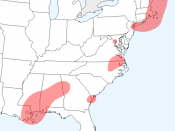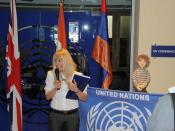American English reflects as much diversity and cultural heritage as the people who speak it. The founding of the American colonies by the English and subsequent emigrations from other countries made the growth of the language and communication as important as survival in the new world. As the country evolved from expansion, commerce, and culture, the language of the population also evolved. The interactions and dialects that formed from this rich patchwork of people coming together are still relevant and traceable in America today. An examination of the history, major regions, and current trends of dialects in American society shows how the growth of the language and its characteristics are uniquely intertwined in American culture and society.
An understanding of the varieties of American English first requires a definition of the term dialect. The American Heritage Dictionary defines dialect as "a variety of the language associated with a particular regional or social group" (237).
The study of American dialect began in 1929 with the American Linguistic Atlas Project, guided by Hans Kurath, an Austrian native who immigrated to the United States in 1907 (Brown). Kurath conducted research on word usage and pronunciation, and knowledge about dialects today is a result of his accomplished work (Kretzschmar). The word dialect itself has many connotations in the mind of the American public. It is often confused with the term accent, and people who use this term imply a negative connotation about the way one is speaking. In reality, accent is simply the way words are pronounced, while dialect has its own vocabulary, grammar, expression, and pronunciation rules (Delaney). Another common misconception about dialect is that it is spoken by someone else. This implies that there is one correct or standard way to speak. The truth of the matter is that "everyone who speaks...



Nice Essay
Excellent Essay! It discusses modern language acquisition in many different regions throughout America. However, I wish it mentioned more about its origins in Britain however (German-Saxon/Norman invasion). Even so, it was very well researched and very informative.
6 out of 6 people found this comment useful.